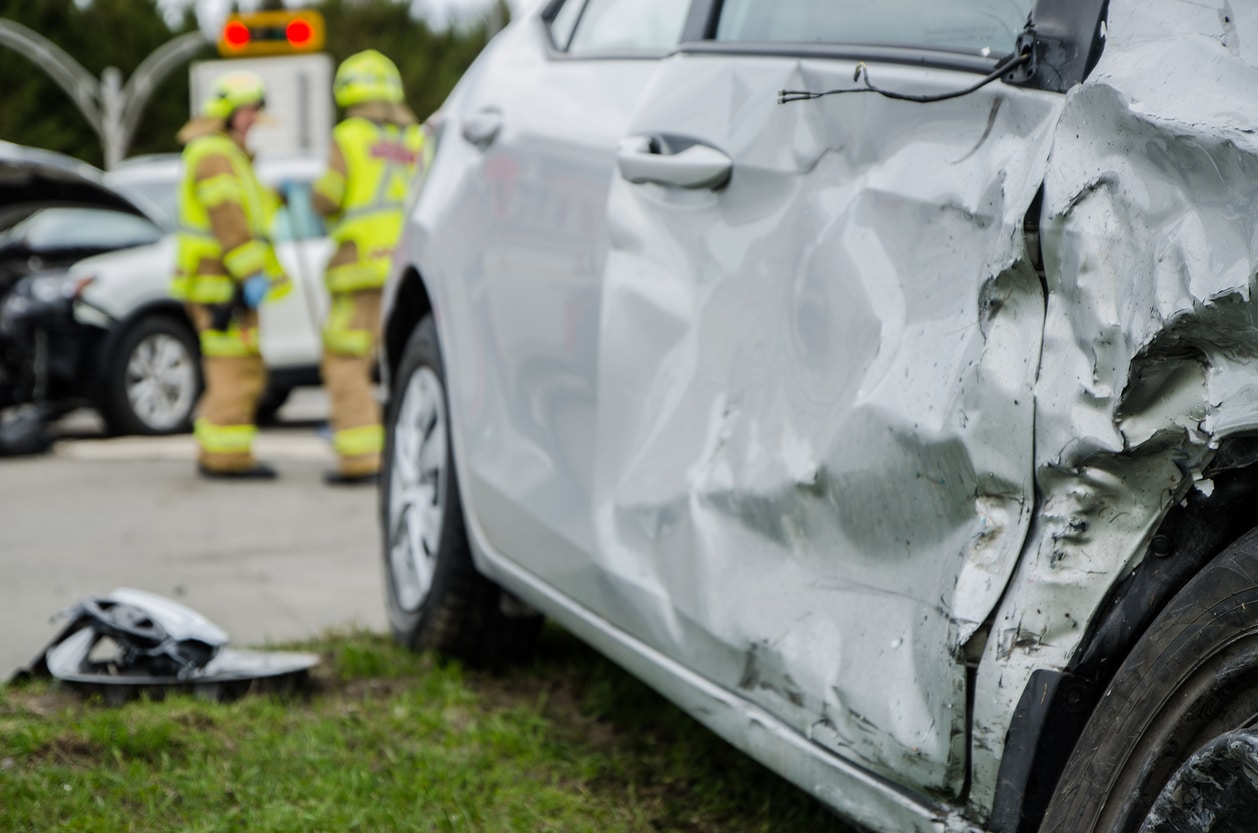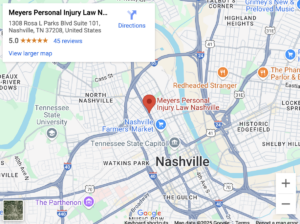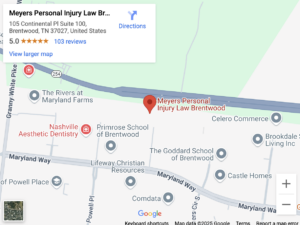Meyers Personal Injury Law | July 31, 2024 | Car Accidents

Admitting fault in a car accident can have significant consequences. When a driver acknowledges their responsibility for an accident, it may impact insurance claims and legal liabilities. Admitting fault in car accidents can jeopardize compensation that might have been otherwise available, making it crucial for individuals involved in accidents to approach this situation carefully. Our Nashville car accident attorneys can provide essential guidance in these scenarios, helping clients navigate statements, insurance interactions, and potential legal exposure to protect their best interests.
In many cases, determining fault is not straightforward. Different types of fault, such as comparative negligence, can complicate the situation. Insurance companies and legal professionals often assess various factors, including the behaviors leading up to the accident, to establish liability.
Understanding fault concepts is essential for anyone involved in a car accident. Whether through direct admissions at the scene or through evaluations by authorities and insurance companies, fault determination influences the outcomes of claims and potential lawsuits. To navigate these complexities, being mindful of what constitutes admitting fault is paramount.
Understanding Admissions of Fault
Admitting fault in a car accident can have significant legal and financial repercussions. This section explores the legal definition and common mistakes that lead to admitting fault.
Legal Definition of Admitting Fault
Legally, admitting fault means acknowledging responsibility for an accident and its consequences. This can occur through explicit verbal statements, written acknowledgments, or implicit actions like apologizing.
Explicit Statements: Saying “It was my fault” or “I didn’t see the other car” can be construed as admissions.
Written Acknowledgments: Signing documents at the accident scene that state responsibility can also constitute an admission of fault.
Implicit Actions: Gestures like offering to pay for damages or repeatedly apologizing might be interpreted as assuming liability.
These admissions can strengthen the case against the admitting party in Nashville personal injury lawsuits, making it easier for the other party to claim damages.
Common Mistakes Leading to Admitted Fault
Common mistakes at the accident scene can lead to unintended admissions of fault.
Statements to Police: Making inaccurate or exaggerated statements to police officers can result in recorded admissions of fault. Always stick to the facts without speculating.
Statements to Insurance Companies: Providing too much information or unverified details to insurance adjusters can inadvertently admit fault. Focus only on objective information.
Post-Accident Behavior: Actions like apologizing or offering to pay for damages might be interpreted as admissions of fault. It is crucial to avoid making any statements or gestures that could be misinterpreted.
Comprehending these nuances can help individuals avoid implicating themselves unintentionally and protect their legal standing in an accident.
The Consequences of Admitting Fault
Admitting fault in a car accident can significantly impact both legal outcomes and financial responsibilities. Understanding these consequences is crucial to navigate post-accident procedures effectively.
Impact on Legal Proceedings
Legal Liability: Admitting fault can instantly make an individual legally liable for the damages resulting from the accident. This admission may be used against them in court to establish liability, leading to a higher burden of proof to contest any claims.
Documented Evidence: Statements made to the police or other parties can be included in official reports. For example, the police report can serve as negligence proof, making it harder to dispute liability later.
Personal Injury Lawsuits: Admitting fault can also expose an individual to personal injury lawsuits from other parties involved. It opens the door for the injured party to seek compensation for medical expenses, lost wages, and other damages.
Financial Ramifications
Insurance Premiums: Admitting fault can lead to increased insurance premiums. Insurers see at-fault drivers as a higher risk, which often results in higher rates upon policy renewal.
Compensation Claims: When someone admits fault, they are less likely to receive compensation from insurance companies, as insurance firms may refuse to cover the at-fault party’s expenses. This can make it difficult to manage repair costs and medical bills.
Coverage Limitations: The type of insurance policy and coverage limits will affect how much financial responsibility falls on the at-fault driver. Drivers may be held responsible for all related costs, beyond what their insurance covers.
By being aware of these potential outcomes, drivers can better prepare and decide on the best course of action following an accident.
Post-Accident Procedures: Dos and Don’ts
Effective handling of a car accident scene involves specific actions and careful communication. Taking the right steps can prevent inadvertent admissions of fault and ensure your rights are protected.
Immediate Actions at the Scene
Ensure safety by moving to a secure location if possible. Check for injuries and call emergency services immediately if anyone is hurt. It is important to gather evidence and documentation at the scene.
Use your phone to take photos of vehicle damage, road conditions, and any visible injuries. Collect contact information from witnesses and other drivers. Avoid discussing the accident in detail with anyone except the police.
Steps to take after an accident include gathering names, phone numbers, and insurance details from all parties involved. Refrain from making any statements that could be misconstrued as admitting fault. Simply state the facts to authorities without offering personal opinions.
Communicating with Authorities and Insurers
When speaking to police officers, provide clear and concise information. Stick to the facts and avoid making assumptions about who is at fault. Be mindful of your words when communicating with insurers.
You should report the accident to your insurance company promptly. Again, focus on factual statements and avoid indicating blame. Words like “sorry” or “I didn’t see” can be used against you later.
If contacted by the other party’s insurance, you are not obligated to provide a statement right away. Requesting time to speak with legal counsel is a wise step to ensure your responses do not inadvertently admit fault.
Seeking Expert Legal Advice
Consulting with the Nashville injury lawyers from Meyers Personal Injury Law can offer critical guidance. Our experienced legal counsel can navigate the complexities of fault determination and protect your interests.
They can assist in investigating the accident, gathering further evidence, and negotiating with insurance companies on your behalf. Legal experts can also help you avoid making statements that could be interpreted as admitting fault.
Contacting legal professionals as soon as possible can ensure your rights are safeguarded from the start. A knowledgeable attorney can also help assess potential compensation for injuries or damages resulting from the accident.
By following these procedures, you can effectively manage the aftermath of a car accident without compromising your legal standing.
Contact Our Nashville Personal Injury Law Firm Today at Meyers Personal Injury Law
If you were injured in an accident in Nashville or Brentwood and need legal help, contact our Nashville personal injury lawyers at Meyers Personal Injury Law to schedule a free case review today.
Meyers Personal Injury Law Nashville
1308 Rosa L Parks Blvd Suite 101,
Nashville, TN 37208
(615) 258-9000
Meyers Personal Injury Law Brentwood
105 Continental Pl Suite 100,
Brentwood, TN 37027
(615) 258-9000



